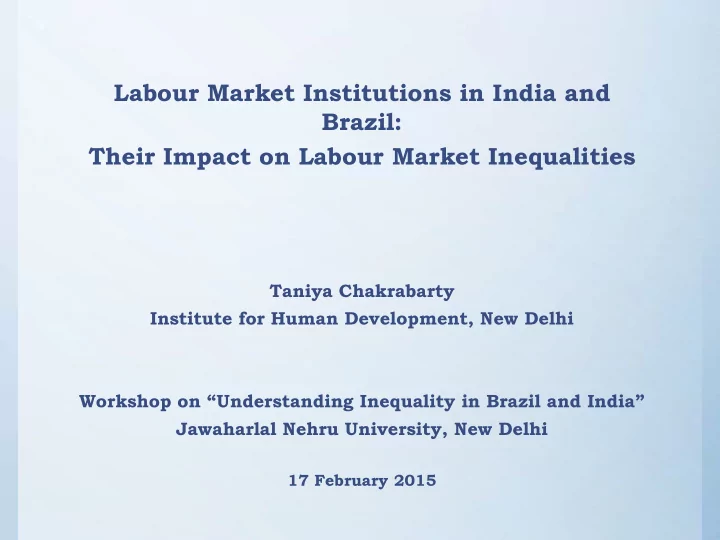

Labour Market Institutions in India and Brazil: Their Impact on Labour Market Inequalities Taniya Chakrabarty Institute for Human Development, New Delhi Workshop on “Understanding Inequality in Brazil and India” Jawaharlal Nehru University, New Delhi 17 February 2015
Workers Movements and the State (1) • Differences in the role of the State • Labour legislations and rules • Multiplicity of unions and decentralized bargaining in India which gave rise to enterprise-level unions and intra- industry wage differences; while Brazil saw the rise of the “new trade unionism” in the late 1970s • Coverage of unions and need to unionize the informal workers 2
Workers Movements and the State (2) • Policy of liberalization in India - made it a priority to reduce labour costs and used different labour contract modalities for a flexible workforce • In Brazil, flexible labour rules had little impact on the market because of union resistance • In India, increasing “informalization” of employment gradually eroded the strength of trade unions by reducing the space for collective bargaining in India. 3
Labour Regulations (1) • Similar structure of labour laws - the Vargas administration (1930 - 1945) and the Indian constitution (1950) • Definition and Coverage • The 1988 constitution in Brazil – linked social protection to the concept of citizenship • Protective labour legislations –Workers Support Fund in Brazil; India has no system of unemployment insurance to date. • Liberalization and Labour Flexibility 4
Labour Regulations (2) • Section V–B of the Industrial Disputes Act (1947) • Informal sector and the Unorganized Workers Sector Social Securities Act 2008 in India • Lack of compliance and effective enforcement of labour laws as a whole • It can be argued that in both countries, labour laws may have contributed in worsening inequality as their implementation proved limited and incomplete; while this is true for Brazil up to 1988, in India this is still valid 5
Wage Setting Institutions India has a wide range of institutions for fixing wages like the Pay • Commissions in the public sector, Wage Boards in some sectors and Collective bargaining in the private sector and the Minimum Wages Act, 1948 The machinery for fixation of minimum wages in India has not been • uniform – multiple rates of minimum wages The importance of minimum wages for Brazil – as a reservation • wage – for bargaining System of Wage Indexation in Brazil • 6
Violation of Minimum Wages Belser and Rani (2011) in their study point out that nearly 42% of all • wage earners receive wages that are below the national minimum wage floor; further, at the state level, almost 27.2% of salaried workers and 52.3 % of all casual workers are paid sub-minimal wages. They further add that female workers and rural workers are more likely to earn sub-minimum wages. In Brazil, on the other hand, only 17.1% of all workers earn less than • minimum wages, with 35.1% of non-registered wage earners and only 1.4% of registered wage earners get sub-minimal wages. These figures have declined over time. 7
I nstitutio ns fo r Jo b Ac c e ss Not all worker possess the equal means of access to the labour • market in India Hiring for jobs across all sectors have been influenced by several • factors Despite the creation of formal institutions such as Employment • Exchanges in the public sector, informal mechanisms like the system of referrals were more popularly used to recruit labour In Brazil, recruitment was mostly informal, depending on the • networks established for unskilled workers in urban areas 8
Co nc lusio n India and Brazil have some issues in common and many differences • In the recent period of higher growth in both countries, Brazil has been much • more successful in converting growth into formal jobs Minimum Wages play a very different role in two countries – in Brazil it is • defined nationally at a fixed level which is much better enforced than in India and has a multiplier effect They face similar challenges in terms of the need to further strengthen • collective bargaining and to include the informal sector which is yet to be included under the legal framework of laws and social security; though Brazil has made more progress than India These findings need to be analysed taking into account the nature of the new • growth regimes under way in both countries 9
T ha nk you 10
Recommend
More recommend